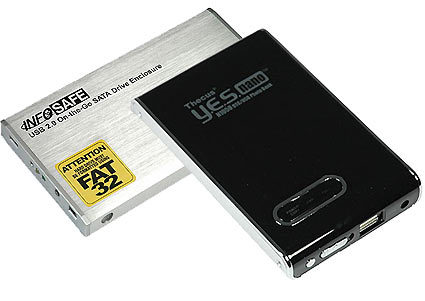Is On-The-Go Storage Ready for Primetime?
Get Tom's Hardware's best news and in-depth reviews, straight to your inbox.
You are now subscribed
Your newsletter sign-up was successful
Chronic Problem: Too Little Data Storage Capacity For Travelers
Today, modern-PC users not only carry more files around with them when they travel compared to years past, the amount of data they generate when on the road is increasing as well. While files are usually stored on PC hard disks when at home or at the office, flash memory storage is fast becoming the storage media of choice for mobile applications. Commonly-used mobile devices vary from miniature memory cards to USB flash drives. These repositories are small and can accommodate up to 16 GB of data. As a rule, however, most people still buy small storages devices with capacities of between 1 GB and 4 GB. Thus, it's just a matter of time before many users run out of storage space for their MP3 players, digital cameras or PDAs.
Given the low prices for memory cards and USB flash drives, you can certainly make an argument that purchasing more of these devices offers an immediate solution to the capacity problem. With 1 GB SD (or miniSD) memory cards going for under $20, this makes sense, even when you consider the many types of memory cards in use these days. That's because our uses for large and small digital devices is also exploding, as is their need for storage.
MP3 players, digital cameras and PDAs have become as much a part of our daily routines as breakfast and the morning commute. Before you jump into your car after breakfast, many users typically load up their MP3 player for the afternoon workout at the gym, and synch their calendar and schedule with a PDA. By the same token, you probably wouldn't dream of leaving the house to meet up with friends or family without taking your digital camera along.
In other parts of life, digital memory is staking out interesting applications as well. More and more car entertainment systems come equipped with memory card readers or USB ports, and likewise, an increasing number of GPS systems also accommodate the same media. As storage capacity requirements continue to increase, you'll find yourself wanting alternatives. On the one hand, storage capacity keeps increasing, yet on the other hand, there are many cases when precious tunes or photos may only reside on memory media, with no backup available anywhere. That's what makes the concept of being able to transfer the contents of memory media onto some other storage medium so attractive, particularly if that process can be done both quickly and easily.
This is where so-called OTG devices come into play. The abbreviation stands for "On the Go" and represents a class of storage devices that can read and store the contents of memory media via a USB 2.0 connection. This technology permits simple transfer of memory media such as USB flash drives or other memory cards (in a USB-attached memory card reader) directly onto an OTG device without a PC.
Join our discussion on this topic
Get Tom's Hardware's best news and in-depth reviews, straight to your inbox.
Current page: Chronic Problem: Too Little Data Storage Capacity For Travelers
Next Page Backup Mobile Data Without A PC
